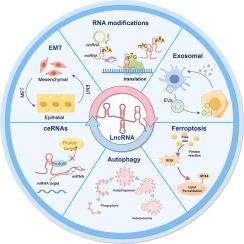Long non-coding RNAs: Emerging regulators of invasion and metastasis in pancreatic cancer
IF 11.4
1区 综合性期刊
Q1 MULTIDISCIPLINARY SCIENCES
引用次数: 0
Abstract
Background
The invasion and metastasis of pancreatic cancer (PC) are key factors contributing to disease progression and poor prognosis. This process is primarily driven by EMT, which has been the focus of recent studies highlighting the role of long non-coding RNAs (lncRNAs) as crucial regulators of EMT. However, the mechanisms by which lncRNAs influence invasive metastasis are multifaceted, extending beyond EMT regulation alone.Aim of review
This review primarily aims to characterize lncRNAs affecting invasion and metastasis in pancreatic cancer. We summarize the regulatory roles of lncRNAs across multiple molecular pathways and highlight their translational potential, considering the implications for clinical applications in diagnostics and therapeutics.Key scientific concepts of review
The review focuses on three principal scientific themes. First, we primarily summarize lncRNAs orchestrate various signaling pathways, such as TGF-β/Smad, Wnt/β-catenin, and Notch, to regulate molecular changes associated with EMT, thereby enhancing cellular motility and invasivenes. Second, we summarize the effects of lncRNAs on autophagy and ferroptosis and discuss the role of exosomal lncRNAs in the tumor microenvironment to regulate the behavior of neighboring cells and promote cancer cell invasion. Third, we emphasize the effects of RNA modifications (such as m6A and m5C methylation) on stabilizing lncRNAs and enhancing their capacity to mediate invasive metastasis in PC. Lastly, we discuss the translational potential of these findings, emphasizing the inherent challenges in using lncRNAs as clinical biomarkers and therapeutic targets, while proposing prospective research strategies.

求助全文
约1分钟内获得全文
求助全文
来源期刊

Journal of Advanced Research
Multidisciplinary-Multidisciplinary
CiteScore
21.60
自引率
0.90%
发文量
280
审稿时长
12 weeks
期刊介绍:
Journal of Advanced Research (J. Adv. Res.) is an applied/natural sciences, peer-reviewed journal that focuses on interdisciplinary research. The journal aims to contribute to applied research and knowledge worldwide through the publication of original and high-quality research articles in the fields of Medicine, Pharmaceutical Sciences, Dentistry, Physical Therapy, Veterinary Medicine, and Basic and Biological Sciences.
The following abstracting and indexing services cover the Journal of Advanced Research: PubMed/Medline, Essential Science Indicators, Web of Science, Scopus, PubMed Central, PubMed, Science Citation Index Expanded, Directory of Open Access Journals (DOAJ), and INSPEC.
 求助内容:
求助内容: 应助结果提醒方式:
应助结果提醒方式:


